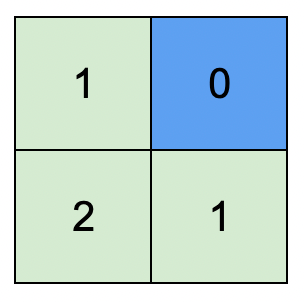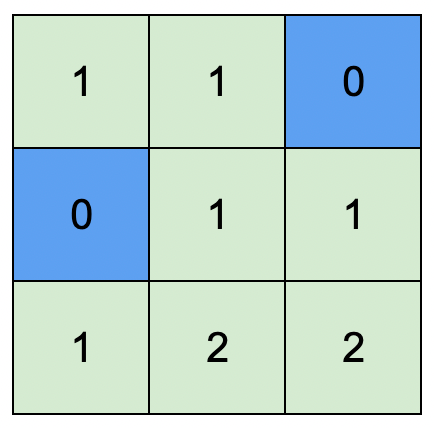Fetch the repository succeeded.
You are given an integer matrix isWater of size m x n that represents a map of land and water cells.
isWater[i][j] == 0, cell (i, j) is a land cell.isWater[i][j] == 1, cell (i, j) is a water cell.You must assign each cell a height in a way that follows these rules:
0.1. A cell is adjacent to another cell if the former is directly north, east, south, or west of the latter (i.e., their sides are touching).Find an assignment of heights such that the maximum height in the matrix is maximized.
Return an integer matrix height of size m x n where height[i][j] is cell (i, j)'s height. If there are multiple solutions, return any of them.
Example 1:

Input: isWater = [[0,1],[0,0]] Output: [[1,0],[2,1]] Explanation: The image shows the assigned heights of each cell. The blue cell is the water cell, and the green cells are the land cells.
Example 2:

Input: isWater = [[0,0,1],[1,0,0],[0,0,0]] Output: [[1,1,0],[0,1,1],[1,2,2]] Explanation: A height of 2 is the maximum possible height of any assignment. Any height assignment that has a maximum height of 2 while still meeting the rules will also be accepted.
Constraints:
m == isWater.lengthn == isWater[i].length1 <= m, n <= 1000isWater[i][j] is 0 or 1.class Solution:
def highestPeak(self, isWater: List[List[int]]) -> List[List[int]]:
m, n = len(isWater), len(isWater[0])
ans = [[-1] * n for _ in range(m)]
q = deque()
for i, row in enumerate(isWater):
for j, v in enumerate(row):
if v:
q.append((i, j))
ans[i][j] = 0
while q:
i, j = q.popleft()
for a, b in pairwise((-1, 0, 1, 0, -1)):
x, y = i + a, j + b
if 0 <= x < m and 0 <= y < n and ans[x][y] == -1:
ans[x][y] = ans[i][j] + 1
q.append((x, y))
return ans
class Solution {
public int[][] highestPeak(int[][] isWater) {
int m = isWater.length, n = isWater[0].length;
int[][] ans = new int[m][n];
Deque<int[]> q = new ArrayDeque<>();
for (int i = 0; i < m; ++i) {
for (int j = 0; j < n; ++j) {
ans[i][j] = isWater[i][j] - 1;
if (ans[i][j] == 0) {
q.offer(new int[] {i, j});
}
}
}
int[] dirs = {-1, 0, 1, 0, -1};
while (!q.isEmpty()) {
var p = q.poll();
int i = p[0], j = p[1];
for (int k = 0; k < 4; ++k) {
int x = i + dirs[k], y = j + dirs[k + 1];
if (x >= 0 && x < m && y >= 0 && y < n && ans[x][y] == -1) {
ans[x][y] = ans[i][j] + 1;
q.offer(new int[] {x, y});
}
}
}
return ans;
}
}
class Solution {
public:
const int dirs[5] = {-1, 0, 1, 0, -1};
vector<vector<int>> highestPeak(vector<vector<int>>& isWater) {
int m = isWater.size(), n = isWater[0].size();
vector<vector<int>> ans(m, vector<int>(n));
queue<pair<int, int>> q;
for (int i = 0; i < m; ++i) {
for (int j = 0; j < n; ++j) {
ans[i][j] = isWater[i][j] - 1;
if (ans[i][j] == 0) {
q.emplace(i, j);
}
}
}
while (!q.empty()) {
auto [i, j] = q.front();
q.pop();
for (int k = 0; k < 4; ++k) {
int x = i + dirs[k], y = j + dirs[k + 1];
if (x >= 0 && x < m && y >= 0 && y < n && ans[x][y] == -1) {
ans[x][y] = ans[i][j] + 1;
q.emplace(x, y);
}
}
}
return ans;
}
};
func highestPeak(isWater [][]int) [][]int {
m, n := len(isWater), len(isWater[0])
ans := make([][]int, m)
type pair struct{ i, j int }
q := []pair{}
for i, row := range isWater {
ans[i] = make([]int, n)
for j, v := range row {
ans[i][j] = v - 1
if v == 1 {
q = append(q, pair{i, j})
}
}
}
dirs := []int{-1, 0, 1, 0, -1}
for len(q) > 0 {
p := q[0]
q = q[1:]
i, j := p.i, p.j
for k := 0; k < 4; k++ {
x, y := i+dirs[k], j+dirs[k+1]
if x >= 0 && x < m && y >= 0 && y < n && ans[x][y] == -1 {
ans[x][y] = ans[i][j] + 1
q = append(q, pair{x, y})
}
}
}
return ans
}
function highestPeak(isWater: number[][]): number[][] {
const m = isWater.length;
const n = isWater[0].length;
let ans: number[][] = [];
let q: number[][] = [];
for (let i = 0; i < m; ++i) {
ans.push(new Array(n).fill(-1));
for (let j = 0; j < n; ++j) {
if (isWater[i][j]) {
q.push([i, j]);
ans[i][j] = 0;
}
}
}
const dirs = [-1, 0, 1, 0, -1];
while (q.length) {
let tq: number[][] = [];
for (const [i, j] of q) {
for (let k = 0; k < 4; k++) {
const [x, y] = [i + dirs[k], j + dirs[k + 1]];
if (x >= 0 && x < m && y >= 0 && y < n && ans[x][y] == -1) {
tq.push([x, y]);
ans[x][y] = ans[i][j] + 1;
}
}
}
q = tq;
}
return ans;
}
use std::collections::VecDeque;
impl Solution {
#[allow(dead_code)]
pub fn highest_peak(is_water: Vec<Vec<i32>>) -> Vec<Vec<i32>> {
let n = is_water.len();
let m = is_water[0].len();
let mut ret_vec = vec![vec![-1; m]; n];
let mut q: VecDeque<(usize, usize)> = VecDeque::new();
let vis_pair: Vec<(i32, i32)> = vec![(-1, 0), (1, 0), (0, -1), (0, 1)];
// Initialize the return vector
for i in 0..n {
for j in 0..m {
if is_water[i][j] == 1 {
// This cell is water, the height of which must be 0
ret_vec[i][j] = 0;
q.push_back((i, j));
}
}
}
while !q.is_empty() {
// Get the front X-Y Coordinates
let (x, y) = q.front().unwrap().clone();
q.pop_front();
// Traverse through the vis pair
for d in &vis_pair {
let (dx, dy) = *d;
if Self::check_bounds((x as i32) + dx, (y as i32) + dy, n as i32, m as i32) {
if ret_vec[((x as i32) + dx) as usize][((y as i32) + dy) as usize] == -1 {
// This cell hasn't been visited, update its height
ret_vec[((x as i32) + dx) as usize][((y as i32) + dy) as usize] =
ret_vec[x][y] + 1;
// Enqueue the current cell
q.push_back((((x as i32) + dx) as usize, ((y as i32) + dy) as usize));
}
}
}
}
ret_vec
}
#[allow(dead_code)]
fn check_bounds(i: i32, j: i32, n: i32, m: i32) -> bool {
i >= 0 && i < n && j >= 0 && j < m
}
}
class Solution:
def highestPeak(self, isWater: List[List[int]]) -> List[List[int]]:
m, n = len(isWater), len(isWater[0])
ans = [[-1] * n for _ in range(m)]
q = deque()
for i, row in enumerate(isWater):
for j, v in enumerate(row):
if v:
q.append((i, j))
ans[i][j] = 0
while q:
for _ in range(len(q)):
i, j = q.popleft()
for a, b in pairwise((-1, 0, 1, 0, -1)):
x, y = i + a, j + b
if 0 <= x < m and 0 <= y < n and ans[x][y] == -1:
ans[x][y] = ans[i][j] + 1
q.append((x, y))
return ans
class Solution {
public int[][] highestPeak(int[][] isWater) {
int m = isWater.length, n = isWater[0].length;
int[][] ans = new int[m][n];
Deque<int[]> q = new ArrayDeque<>();
for (int i = 0; i < m; ++i) {
for (int j = 0; j < n; ++j) {
ans[i][j] = isWater[i][j] - 1;
if (ans[i][j] == 0) {
q.offer(new int[] {i, j});
}
}
}
int[] dirs = {-1, 0, 1, 0, -1};
while (!q.isEmpty()) {
for (int t = q.size(); t > 0; --t) {
var p = q.poll();
int i = p[0], j = p[1];
for (int k = 0; k < 4; ++k) {
int x = i + dirs[k], y = j + dirs[k + 1];
if (x >= 0 && x < m && y >= 0 && y < n && ans[x][y] == -1) {
ans[x][y] = ans[i][j] + 1;
q.offer(new int[] {x, y});
}
}
}
}
return ans;
}
}
class Solution {
public:
const int dirs[5] = {-1, 0, 1, 0, -1};
vector<vector<int>> highestPeak(vector<vector<int>>& isWater) {
int m = isWater.size(), n = isWater[0].size();
vector<vector<int>> ans(m, vector<int>(n));
queue<pair<int, int>> q;
for (int i = 0; i < m; ++i) {
for (int j = 0; j < n; ++j) {
ans[i][j] = isWater[i][j] - 1;
if (ans[i][j] == 0) {
q.emplace(i, j);
}
}
}
while (!q.empty()) {
for (int t = q.size(); t; --t) {
auto [i, j] = q.front();
q.pop();
for (int k = 0; k < 4; ++k) {
int x = i + dirs[k], y = j + dirs[k + 1];
if (x >= 0 && x < m && y >= 0 && y < n && ans[x][y] == -1) {
ans[x][y] = ans[i][j] + 1;
q.emplace(x, y);
}
}
}
}
return ans;
}
};
func highestPeak(isWater [][]int) [][]int {
m, n := len(isWater), len(isWater[0])
ans := make([][]int, m)
type pair struct{ i, j int }
q := []pair{}
for i, row := range isWater {
ans[i] = make([]int, n)
for j, v := range row {
ans[i][j] = v - 1
if v == 1 {
q = append(q, pair{i, j})
}
}
}
dirs := []int{-1, 0, 1, 0, -1}
for len(q) > 0 {
for t := len(q); t > 0; t-- {
p := q[0]
q = q[1:]
i, j := p.i, p.j
for k := 0; k < 4; k++ {
x, y := i+dirs[k], j+dirs[k+1]
if x >= 0 && x < m && y >= 0 && y < n && ans[x][y] == -1 {
ans[x][y] = ans[i][j] + 1
q = append(q, pair{x, y})
}
}
}
}
return ans
}
此处可能存在不合适展示的内容,页面不予展示。您可通过相关编辑功能自查并修改。
如您确认内容无涉及 不当用语 / 纯广告导流 / 暴力 / 低俗色情 / 侵权 / 盗版 / 虚假 / 无价值内容或违法国家有关法律法规的内容,可点击提交进行申诉,我们将尽快为您处理。